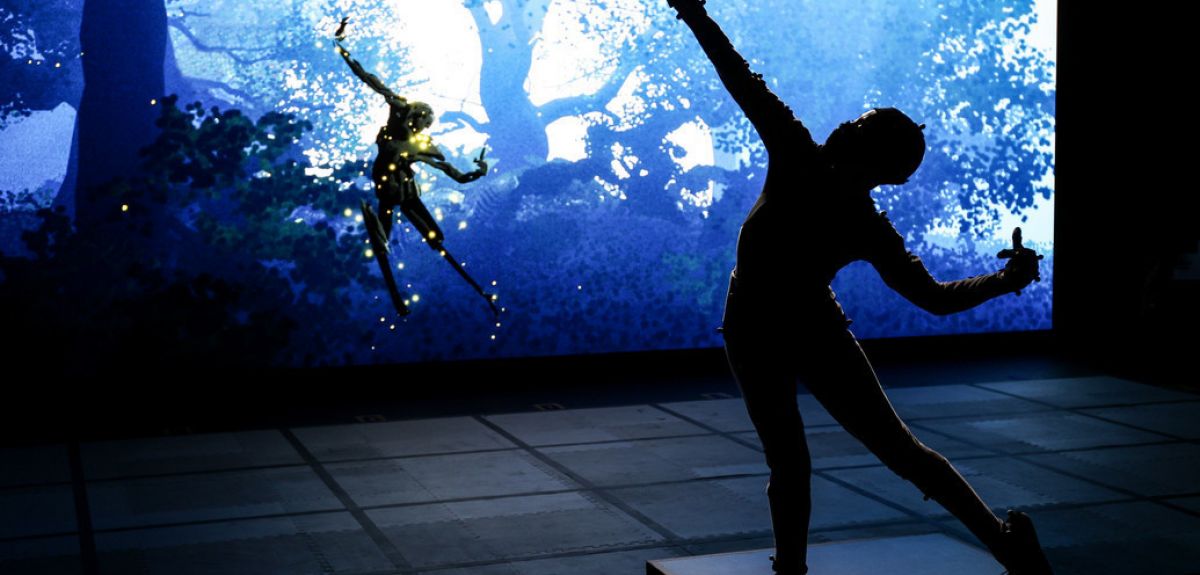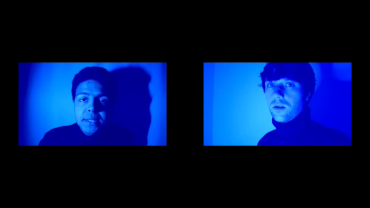
Theatre in the time of Covid: the show has gone on.
By Ruth Moore, TORCH Theatre and Performance Officer.
When theatres shut on 16 March 2020, no one imagined that ‘going dark’ would last so long and cost so much.
As the weeks dragged on, theatre historians reminded us of closures for plague and war in the 16th century and the Blitz, and speculated about how quickly live performance would bounce back. For theatre decision-makers in Oxford and around the world, the 21st century calculations were terrifying. In the UK, the government's Cultural Recovery Fund grants made the difference for some, but others were not so fortunate. And the plight of freelance artists, the lifeblood of the theatre industry, is well documented.
Here at TORCH, The Oxford Research Centre in the Humanities, we watched from the wings, supporting our projects to adapt, and seeking ways to amplify conversations about the future of live performance. We find ourselves in another uncertain phase. Theatres are legally able to operate at full capacity, but there are continuing concerns over self-isolating cast members and anxious audiences. Here we look back at some of the emergent themes of theatre in a pandemic.
 Duchess of Malfi, Creation Theatre 2021 (Actors Kofi Dennis and Andy Owens)
Duchess of Malfi, Creation Theatre 2021 (Actors Kofi Dennis and Andy Owens)
From the beginning, it was evident that, while theatre buildings went dark, theatre itself would not be silenced by the virus. An amazingly diverse range of virtual theatre sprang up. It was ‘unified as a genre only by its reliance on Wi-Fi’, as Vinson Cunningham wrote in the New Yorker.
Theatre lovers could spend virtually every minute of lockdown watching premieres of glittering ‘NT At Home’ productions such as Small Island and Angels in America, or browsing through the back catalogues of a global collection of theatre companies, or debating whether to brave going ‘camera on’ for live, experimental Zoom performances.
To those who know the theatre world well, this outpouring of creativity came as no surprise. Speaking at a TORCH event, Ria Parry, co-director of the North Wall Arts Centre reflected, ‘You give a problem to artists and it's not a problem… it's a challenge… put a load of graft and talent in the mix and suddenly it turns into something extraordinary and beautiful and brilliant.’[1]
Sometimes, the experience really was extraordinary. Oxford’s innovative Creation Theatre Company was in the first wave to push the limits of live-streamed performance, including a partnership with Big Telly and Charisma.ai to see audiences caught up in the action in ‘Alice: A Virtual Themepark’. That same can-do, innovative spirit infused a recent Knowledge Exchange production of The Duchess of Malfi, with Dr Laura Wright.
 Adventures in Digital – image Creation Theatre. Design Keiko Ikeuchi
Adventures in Digital – image Creation Theatre. Design Keiko IkeuchiSpeaking about the ground-breaking digital repertory company used for Malfi, Artistic Director Lucy Askew said, ‘We can really start to build on each experience and each show and unpick different things and explore different kinds of digital propositions with each piece of work.’[2]
As companies large and small worked with these new formats, it became evident that the pandemic was accelerating an existing trend. Sarah Ellis, Director of Digital Development at the Royal Shakespeare Company, noted, ‘What happened was this form of accelerated disruption… we'd been slowly emerging into those hybrid worlds and then suddenly with the pandemic it cracked open the future in the moment that we were in and exposed the fact that we're very much first draft in this space.’[3]
First draft, perhaps, but the drafts are exciting, and speaking at the same event, Oxford Professor Emma Smith, who has worked with the RSC, expressed her hope that, as we emerge from the pandemic, ‘That there isn't a reactionary move towards an idea of theatre which is in some ways quite limited.’[4]
Of course, many have felt the loss of being ‘in the room’. But, at TORCH and among our partners, we have also felt a deep appreciation for the way virtual events have opened us up to new audiences. Barriers of all kinds - geographical, financial, socio-cultural - have been broken down, and the mood is clear: theatre must build on this.
Building a stronger theatre
 Oxford Playhouse for the #lightitinred campaign; by Ash Bale, Oxford Playhouse
Oxford Playhouse for the #lightitinred campaign; by Ash Bale, Oxford PlayhouseMany theatres are considering how to retain and develop the online audiences they have won, even as doors re-open. This includes the Young Vic’s ‘Best Seat in Your House’ project, an audacious decision to provide a livestream of every play going forwards.
For the first time, audience members who do not want to be in the room or who physically cannot be in the room are being heard. With the emergence of hybrid methodologies, theatres can offer them a choice – although the additional costs can be difficult to navigate.
The same hybrid thinking is evident among theatre outreach and learning teams. These behind-the-scenes professionals provided a vital lifeline between theatres and audiences throughout 2020, and again showed extraordinary resilience in working out how to adapt. While some participants are anxious to get back in the building, others found new possibilities online. Paul Simpson, Participation Manager at Oxford Playhouse noted an ability ‘to be in some instances more expressive because they're in the comfort of their own homes'. [6]
Another pressing theme in the past year has been the need to pay close, practical attention to dismantling racism within the cultural sector. Even as members battled to keep their organisations afloat, Oxford’s Cultural Partnership worked collaboratively to form the Oxford Cultural Anti-Racism Alliance. A successful Arts Council bid is now fostering cross-institutional efforts to support Global Majority artists, to embed better recruitment practices, and to champion leadership development. Across the industry, similar initiatives are gaining ground.
There is a lot to be excited about, and many have noted a remarkable spirit of collaboration across the industry through each stage of the pandemic. As theatres move forward in exploring all these areas, we hope that this spirit will endure. At a recent event, James Dacre, Artistic Director of Royal & Derngate Theatres, Northampton, emphasised, ‘The importance now of making work, touring work, and reigniting the sector… ensuring that the support that we've been lucky enough to have from our audiences, from government, from local authorities now can go directly towards engaging the freelance workforce who are the lifeblood of course of our sector in every way.’[7]
But with finances still precarious for everyone from commercial theatre producers to small touring companies, there are many delicate questions about what is programmed and whom is cast. To make bold decisions in these areas requires an answering boldness in audiences.
As the curtain goes up
 Farewell to Zoom? design Keiko Ikeuchi
Farewell to Zoom? design Keiko Ikeuchi19 July 2021, the much touted ‘freedom day’, turned into a day of misery for some theatres with a string of high-profile show cancellations and delays because of the ‘pingdemic’. As we wait to see how theatres fare through the late summer of 2021, we urge ourselves and our networks to support every way we can.
Arifa Akbar, the chief theatre critic at The Guardian, spoke for many when she said theatre in the pandemic, ‘Became much more self-reflective… I found myself engaging with those things and… the ideal of what theatre could be; what we, what I might hope for it to be when things open up again.’[8]
As curtains go up around the country, hope can be shown in the tickets we buy, the reviews we share, and the projects we commission.
With thanks to all who took part in our recent conversations, and to support from the Higher Education Innovation Fund and the University’s KE Seed Fund.
[1] Ria Parry, ‘Never Such Innocence’, 29 March 2021
[2] Lucy Askew, ‘Adventures in Digital’, 4 March 2021
[3] Sarah Ellis, ‘A Farewell to Zoom?’ 10 June 2021
[4] Emma Smith, ‘A Farewell to Zoom?’ 10 June 2021
[5] Louise Chantal, ‘Never Such Innocence’ 29 April 2021
[6] Check out discussion in ‘It’ll Never Work on Zoom’, 20 May 2021
[7] James Dacre, ‘Never Such Innocence’ 29 April 2021
[8] Arifa Akbar, ‘Never Such Innocence’ 29 April 2021
 What US intervention could mean for displaced Venezuelans
What US intervention could mean for displaced Venezuelans  10 years on: The Oxford learning centre making an impact
10 years on: The Oxford learning centre making an impact Oxford and The Brilliant Club: inspiring the next generation of scholars
Oxford and The Brilliant Club: inspiring the next generation of scholars New course launched for the next generation of creative translators
New course launched for the next generation of creative translators The art of translation – raising the profile of languages in schools
The art of translation – raising the profile of languages in schools  Tracking resistance: Mapping the spread of drug-resistant malaria
Tracking resistance: Mapping the spread of drug-resistant malaria